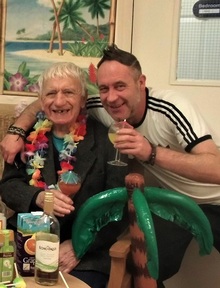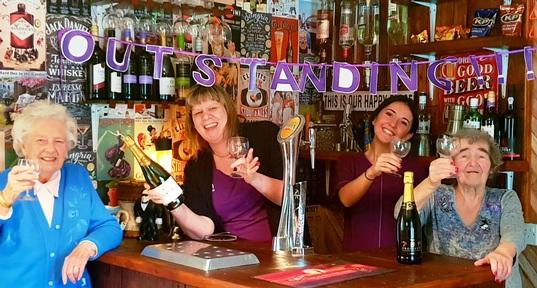Singing for the Brain in care homes 'unlocks memories' in those living with dementia
Singing for the Brain is a group activity which has been carefully designed for people with memory loss to receive the many health benefits that are woven into the fun of singing.

The scheme is run by Alzheimer’s Society in 30 locations nationwide and aims to boost confidence, self-esteem and quality of life by involving people with dementia in interactive sing-song sessions.
Singing for the Brain started when founder Chreanne Montgomery-Smith noticed how many residents responded positively to music while working in a nursing home.
“One of the activities I carried out was a quiz which involved playing familiar tunes. The first week I did it nobody sang, the second week a few people joined in. By the third week everybody was singing along. One lady who didn’t know her own name knew every song in the quiz and sang them all.
“It made me realise that people with dementia had a special ability to remember songs. Even if people with dementia can’t talk, they may be able to sing, whistle, clap or tap their feet. It helps them, and their carers to feel life is worthwhile,” she explained.
Singing for the Brain is led by a trained facilitator who encourages individuals to meet for light refreshments and chat beforehand to help people relax and get to know each other. Once the session starts, individuals gather in a circle and participate in exercises to warm up their voice, before singing a range of songs, either unaccompanied or sometimes using musical instruments.
Singing is not only an enjoyable activity, it can also provide a way for people with dementia, along with their care workers, to express themselves and socialise with others in a fun and supportive group.
The power of music, particularly singing, can unlock memories and kick-start the grey matter that is an increasingly key feature of dementia care. Even when many memories are hard to retrieve, music is especially easy to recall.
Previous research has suggested that singing can reach parts of the damaged brain in ways other forms of communication cannot. Professor Paul Robertson, a concert violinist and academic who has made a study of music in dementia care, said: “We tend to remain contactable as musical beings on some level right up to the very end of life. We know that the auditory system of the brain is the first to fully function at 16 weeks, which means that you are musically receptive long before anything else. So it’s a case of first in last out when it comes to a dementia-type breakdown of memory.”
HC-One’s Rose Court Care Home in Radcliffe, Bury, received a visit from Singing for the Brain in April 2016, which was enjoyed by the residents, relatives and staff. It offered a way for those living with dementia an opportunity to express themselves and have fun in a social gathering.
A representative from Alzheimer’s Society handed out song sheets to the residents and played his accordion whilst they sang along.
Karen Davies, Rose Court care home manager, said: “Our residents had a wonderful time singing along to the songs. They evoked many memories which were talked about for many hours after the representative had left and we’re all looking forward to his next visit.”
HC-One managing director Glen Mason, added: “Organising memorable events like this is an important part of how HC-One provides the kindest care.”
Kathryn Smith, director of operations, added: “For a person who is living with dementia, memories can become increasingly hard to retrieve, however music can sometimes help recall due to the preserved memory for song and music in the brain.
“Many people with dementia are still able to enjoy music and sing even when they are starting to lose their language abilities. We know that singing can help people with dementia communicate, improve their mood, and leave them feeling good about themselves.
“Singing for the Brain groups can provide a way for people with dementia to express themselves and socialise with others in a fun and mutually supportive environment.”
For more information on Singing for the Brain visit: https://www.alzheimers.org.uk/site/scripts/documents_info.php?documentID=760
Latest Innovative Care News
 13-May-19
'Pink drink' brain cancer treatment rolled out across NHS in memory of Baroness Jowell
13-May-19
'Pink drink' brain cancer treatment rolled out across NHS in memory of Baroness Jowell
 25-Apr-19
Louis Tomlinson helps 83-year-old who lost wife to dementia complete bucket list
25-Apr-19
Louis Tomlinson helps 83-year-old who lost wife to dementia complete bucket list
 22-Mar-19
UK's top care home handyman takes residents to pub for pie and pint
22-Mar-19
UK's top care home handyman takes residents to pub for pie and pint
 12-Feb-19
Michael McIntyre's jokes tested to see if they stop elderly catching flu
12-Feb-19
Michael McIntyre's jokes tested to see if they stop elderly catching flu
 07-Jan-19
'We were lucky to find it': Family's delight as care home is rated Outstanding
07-Jan-19
'We were lucky to find it': Family's delight as care home is rated Outstanding